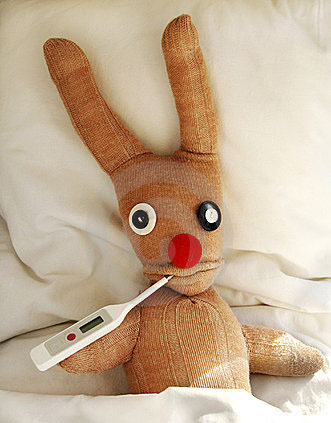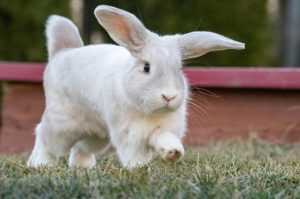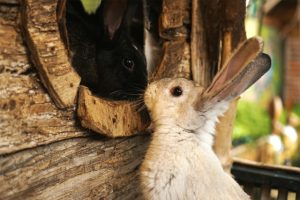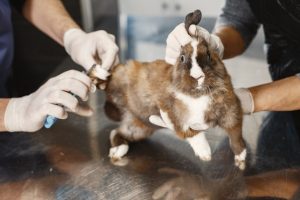
Rabbits have quite sensitive digestive tracts and pet rabbits may become constipated if their digestive system is thrown out of balance. This can lead to death if not addressed as soon as possible. Constipation in rabbits can be caused by stress, illness, intestinal blockage or dental problems, but pet rabbits often become constipated when they aren’t being fed a proper diet.
Symptoms of a constipated rabbit include
- not eating
- very few or no droppings being produced
- rabbit sitting hunched up
- a swollen stomach
A rabbit may become constipated when there are hard faeces which are difficult for the rabbit to expel. There is a much higher risk of constipation when a rabbit is moulting because as they groom themselves, they ingest hair which passes into their intestinal tract and sometimes forms blockages. Because of this, moulting rabbits must be brushed frequently to remove hair.
Constipation can generally be prevented by feeding the correct diet of 80% hay as the high fibre content keeps the rabbit’s digestive tract running smoothly. The hay provides pressure that keeps things moving thru the gastrointestinal (GI) tract. Proper hydration is also essential, so be sure they have enough water. A handful of leafy greens such as romaine lettuce will help with hydration too.
If your rabbit is hunched over in pain, has stopped eating, and has passed small, hard stool or not passed any stool at all in 12 or more hours, she may be constipated. If your rabbit is constipated you should take them to the vet without delay.
If you’re unable to take your rabbit to the vet immediately, remove the rabbit's dry food or crush it and mix with water into a slurry, feed more hay and fresh vegetables and ensure it has plenty of fresh water. Do not feed it fruit as it’s too sugary and hard on their system. Carrots also contain too much sugar and can cause the issue to escalate. Encourage the rabbit to exercise, and give very small doses of olive oil orally which can help with mild constipation.
The best way to avoid this often deadly condition is to ensure your bunny has a diet rich in fibre, access to plenty of clean, fresh water and a varied assortment of vegetables. Avoid starchy foods like bread, pastries and cereal, and avoid chocolate at all costs.
A healthy diet of hay, pellets and an assortment of rabbit-safe vegetables should keep your rabbit’s digestive tract functioning nicely.





